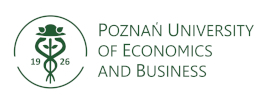
Fundamentals of marketing
Syllabus
Basic information
- Field of study*
- Bachelor in Business Administration
- Specialisation
- -
- Organizational unit
- UEP
- Level of qualification
- First-cycle programme
- Mode of study
- Full-time
- Track
- General academic
- Didactic cycle
- 2020/2021
- Subject code
- UEPBBAS.12B.6780.20
- Language of instruction
- English
- Mandatory
- Obligatory
- Block
- Block B
|
Period
Semester 2
|
Method of evaluation
Exam
Activities and hours
|
Number of ECTS points
4
|
Subject’s educational aims
| C1 | N/A : Familiarise students with the essence and basic marketing functions |
| C2 | N/A : Familiarise students with the most important marketing tools |
| C3 | N/A : Develop the skills of taking into account the needs and behaviour of buyers when planning marketing activities |
Entry requirements
brak
Subject's learning outcomes
| Code | Outcomes in terms of | Effects | Examination methods |
| Knowledge | |||
| W1 | N/A : The student organizes and characterizes the most important marketing functions | K1_W04, K1_W07 | Written exam, Written exam with open questions |
| W2 | N/A : Student can identify marketing tools which may help to solve specific problems | K1_W04, K1_W07 | Written exam, Written exam with open questions |
| W3 | N/A : Student explains the most important marketing-mix strategies | K1_W04, K1_W07 | Written exam, Written exam with open questions |
| Skills | |||
| U1 | N/A : The student uses marketing tools to analyze the environment and the potential of the company | K1_U01, K1_U06 | Written exam with open questions, Group project / Group work, Presentation |
| U2 | N/A : The student plans and performs simple consumer research on the product, brand and price | K1_U01, K1_U06 | Group project / Group work |
| U3 | N/A : Student creates a marketing plan | K1_U03, K1_U04 | Group project / Group work |
| Social competences | |||
| K1 | N/A : Students prepare a marketing presentation in a team | K1_K01 | Group project / Group work, Presentation |
Study content
| No. | Course content | Subject's educational goals | Subject's learning outcomes |
| 1. | N/A : Marketing concept and functions | C1 | W1 |
| 2. | N/A : Consumer behaviour | C1, C3 | W1 |
| 3. | N/A : Market segmentation | C1 | W2 |
| 4. | N/A : Marketing-mix concept | C2 | W3, U3 |
| 5. | N/A : Product Life Cycle | C2 | W2, U1 |
| 6. | N/A : Product portfolio management | C2 | W2, W3, U1 |
| 7. | N/A : Marketing research of a product | C3 | U2, K1 |
| 8. | N/A : Brand management | C2 | W2, U1 |
| 9. | N/A : Marketing research of a brand | C3 | U2, K1 |
| 10. | N/A : Promotion mix – advertising and PR | C2 | W2, W3 |
| 11. | N/A : Promotion-mix – sales promotion, personal selling and direct marketing | C2 | W2, W3 |
| 12. | N/A : Promotion management | C2 | W2, U1, U3 |
| 13. | N/A : Pricing strategies | C2 | W2, W3 |
| 14. | N/A : Marketing research of prices | C3 | U2, K1 |
| 15. | N/A : Distribution strategy | C2 | W2, W3 |
Bibliography
Obligatory- "Principles of Marketing (17th Edition)", Ph. Kotler, G. Armstrong, 2017
- Principles of Marketing (3rd Edition) By: Frances Brassington and Stephen Pettitt Publisher: UK: Pearson Education, 2006
- Fundamentals of Marketing, Autor Edward Russell, Bloomsbury Publishing, 2009
- Marilyn A. Stone, John Desmond, Fundamentals of Marketing, Taylor & Francis Ltd, Routledge Publication 2006
- Iwan Setiawan, Hermawan Kartajaya , Philip Kotler, Marketing 4.0, 2016
- Marketing Insights from A to Z: 80 Concepts Every Manager Needs to Know by Philip Kotler, Wiley & Sons 2003
Course advanced
Teaching methods:
Project method, Conversation lecture, Lecture with multimedia presentation, Discussion, Game, Case study, Exercises
| Teaching methods | Method of evaluation | Credit conditions |
|---|---|---|
| Lectures | Written exam, Written exam with open questions | |
| Classes | Group project / Group work, Presentation |
Calculation of ECTS points
| Activity form | Activity hours* | |
| Participation in lectures | 15 | |
| Participation in classes | 30 | |
| Project preparation | 40 | |
| Preparation of multimedia presentation | 5 | |
| Preparation for exam | 10 | |
| Preparation for classes | 5 | |
| Consultations with teacher | 15 | |
| Student workload |
Hours
120
|
ECTS
4.0
|
| Workload involving teacher |
Hours
60
|
ECTS
2.0
|
| Practical workload |
Hours
70
|
ECTS
2.5
|
* one hour of classes = 45 minutes